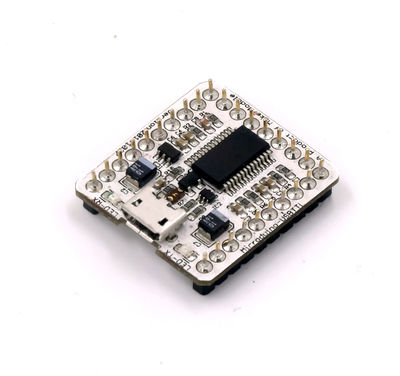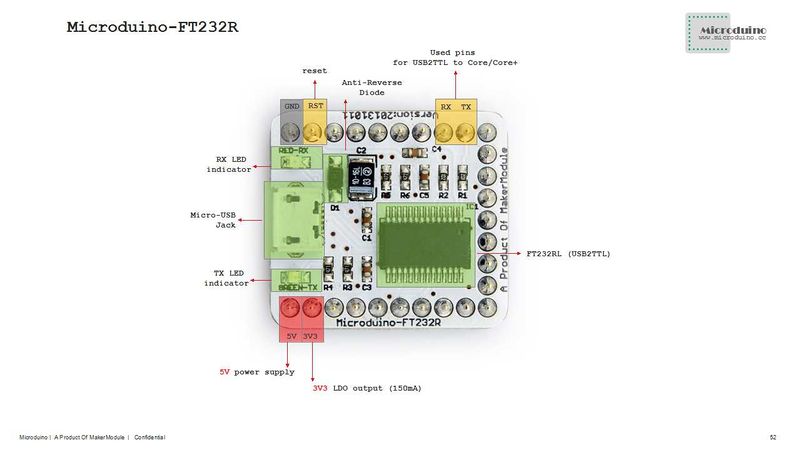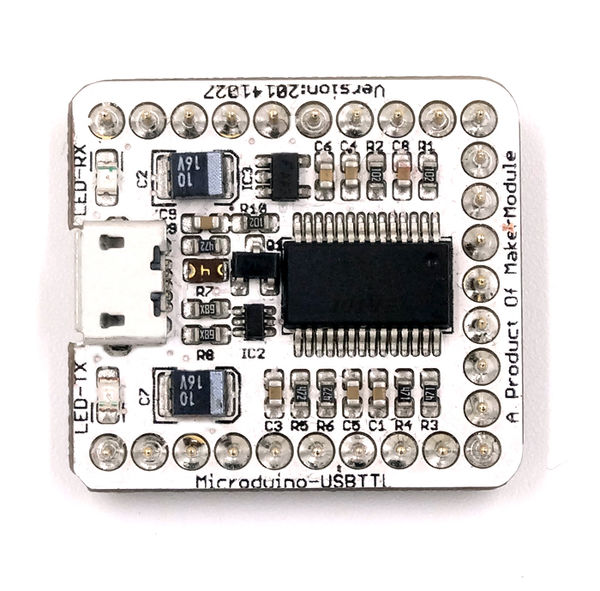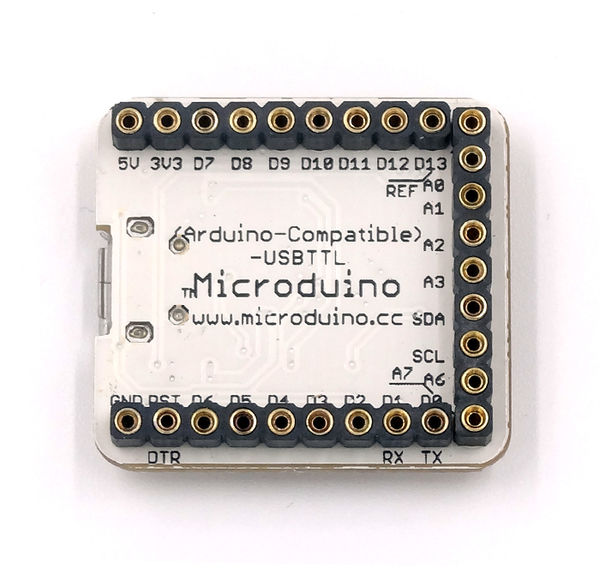Difference between revisions of "Microduino-USB2TTL"
From Microduino Wiki
(Created page with "{{Language|Microduino-USB2TTL}} {| style="width: 800px;" |- | 400px|thumb|right|Microduino-FT232R '''Microduino-USB2TTL''' is a USB to ...") |
|||
| Line 1: | Line 1: | ||
| − | {{Language|Microduino- | + | {{Language|Microduino-USBTTL}} |
{| style="width: 800px;" | {| style="width: 800px;" | ||
|- | |- | ||
| | | | ||
[[file:Microduino-ft232r-rect.jpg|400px|thumb|right|Microduino-FT232R]] | [[file:Microduino-ft232r-rect.jpg|400px|thumb|right|Microduino-FT232R]] | ||
| − | '''[[Microduino- | + | '''[[Microduino-USBTTL]]''' is a USB to serial UART interface module, it is based on FDTI FT232RL chip (Arduino embedded driver). '''[[Microduino-USBTTL]]''' can be stacked with '''[[Microduino-Core]]''' or '''[[Microduino-Core+]]''', enable Microduino core modules communicating with PC. |
| − | The | + | The USBTTL has optional clock generator output, and the new FTDIChip-ID? security dongle feature. In addition, asynchronous and synchronous bit bang interface modes are available. |
| − | USB to serial designs using the | + | USB to serial designs using the USBTTL is simplified by fully integrating the external EEPROM, clock circuit and USB resistors onto the device. |
|- | |- | ||
| | | | ||
==Features== | ==Features== | ||
| − | * The '''[[Microduino- | + | * The '''[[Microduino-USBTTL]]''' is a USB to serial UART interface with optional clock generator output, asynchronous and synchronous bit bang interface modes are available. |
| − | * The '''[[Microduino- | + | * The '''[[Microduino-USBTTL]]''' adds two new functions compared with its predecessors, effectively making it a "3-in-1" chip for some application areas. The internally generated clock (6MHz, 12MHz, 24MHz, and 48MHz) can be brought out of the device and used to drive a microcontroller or external logic. A unique number (the FTDIChip-ID?) is burnt into the device during manufacture and is readable over USB, thus forming the basis of a security dongle which can be used to protect designers' application software from being copied. |
* Using the U-Shape 27-pin interface (UPin-27), the standard interface of Microduino, all Microduino modules and sensors can be easily stacked and extended through it | * Using the U-Shape 27-pin interface (UPin-27), the standard interface of Microduino, all Microduino modules and sensors can be easily stacked and extended through it | ||
* Delivered ready to plug in. | * Delivered ready to plug in. | ||
| Line 57: | Line 57: | ||
==Documents== | ==Documents== | ||
| − | * '''[[Microduino- | + | * '''[[Microduino-USBTTL]]''' Eagle source file 【'''[[media:Microduino-FT232R.zip|download]]'''】 |
| − | * '''[[Microduino- | + | * '''[[Microduino-USBTTL]]''' main chips and devices |
** Main chip: '''[[media:DS_FT232R.pdf|Datasheet of FT232R]]''' | ** Main chip: '''[[media:DS_FT232R.pdf|Datasheet of FT232R]]''' | ||
** Micro USB: '''[[media:MicroUSB.doc|MicroUSB]]''' | ** Micro USB: '''[[media:MicroUSB.doc|MicroUSB]]''' | ||
| Line 67: | Line 67: | ||
==Development== | ==Development== | ||
| − | Uploading Arduino program to Microduino-Core/Core+ with '''[[Microduino- | + | Uploading Arduino program to Microduino-Core/Core+ with '''[[Microduino-USBTTL]]''' |
* 1. Install Arduino IDE: Microduino use the same IDE as Arduino, please download Arduino IDE from 【'''[http://arduino.cc/en/Main/Software Arduino IDE official]'''】 and install it in your disk. (if you already have it, just skip this step). Please check Arduino IDE details from 【'''[http://arduino.cc/en/Reference/HomePage Reference]'''】 and 【'''[http://arduino.cc/en/Tutorial/HomePage Workshop]'''】. | * 1. Install Arduino IDE: Microduino use the same IDE as Arduino, please download Arduino IDE from 【'''[http://arduino.cc/en/Main/Software Arduino IDE official]'''】 and install it in your disk. (if you already have it, just skip this step). Please check Arduino IDE details from 【'''[http://arduino.cc/en/Reference/HomePage Reference]'''】 and 【'''[http://arduino.cc/en/Tutorial/HomePage Workshop]'''】. | ||
* 2. Patch Microduino package: Please download Microduino package for Arduino IDE from 【'''[[media:Microduino.zip|download]]'''】, and unzip is to {Your Arduino Install Driectory}/hardware directory. | * 2. Patch Microduino package: Please download Microduino package for Arduino IDE from 【'''[[media:Microduino.zip|download]]'''】, and unzip is to {Your Arduino Install Driectory}/hardware directory. | ||
* Microduino Arduino IDE Reference workshop: 【'''[[Arduino IDE Microduino Configuration]]'''】. | * Microduino Arduino IDE Reference workshop: 【'''[[Arduino IDE Microduino Configuration]]'''】. | ||
| − | * 3. Programming: Upload program to '''[[Microduino-Core]]''' or '''[[Microduino-Core+]]''' through Arduino IDE, with '''[[Microduino- | + | * 3. Programming: Upload program to '''[[Microduino-Core]]''' or '''[[Microduino-Core+]]''' through Arduino IDE, with '''[[Microduino-USBTTL]]''' module. |
* 4. Enjoy your Microduino journey! | * 4. Enjoy your Microduino journey! | ||
Revision as of 02:32, 13 August 2014
| Language: | English • 中文 |
|---|
|
Microduino-USBTTL is a USB to serial UART interface module, it is based on FDTI FT232RL chip (Arduino embedded driver). Microduino-USBTTL can be stacked with Microduino-Core or Microduino-Core+, enable Microduino core modules communicating with PC. The USBTTL has optional clock generator output, and the new FTDIChip-ID? security dongle feature. In addition, asynchronous and synchronous bit bang interface modes are available. USB to serial designs using the USBTTL is simplified by fully integrating the external EEPROM, clock circuit and USB resistors onto the device. |
ContentsFeatures
|
Specifications
|
Documents
|
DevelopmentUploading Arduino program to Microduino-Core/Core+ with Microduino-USBTTL
|
Applications |
Buy |
History
|
Pictures |



